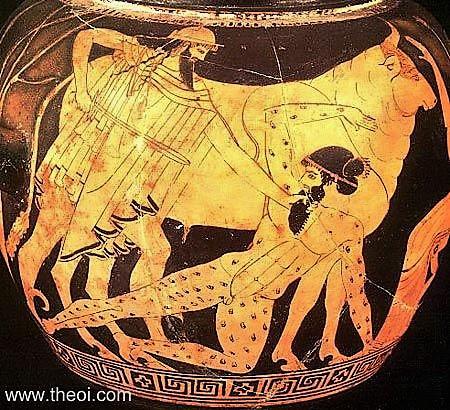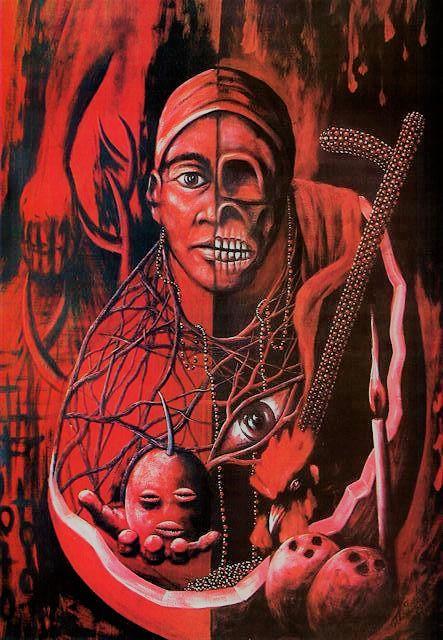Shadow-Trickster Donald Trump, preaching revolutionary change and unending prosperity, emerged from the shadow of hatred and aggression, and now proceeds to install one of the most repressive, socially regressive, selfish, greedy, and racist US Presidential Administrations in generations. It must be resisted, but with a trickster spirit.


Trump. Puer. Trickster Shadow.
By Hecate Demeter, Published in Hecate Demeter
Inside the terrifying stew of insecurity and trauma that passes for Donald Trump’s own mind, I believe that he sees himself as The Emperor, The King of Pentacles, The Knight of Swords. He’s Zeus, the all-powerful thunder god, raping his way across (America,) Europe, and Asia. He’s Mars, always victorious, always vanquishing his business rivals, his enemies, his targets. He’s Uther Pendragon before Merlin gets what he wants and deserts him. There is no way that he can ever lose to any mere woman.
But that’s the glamour (and I use that word in its Witchiest sense) that he longs to project — to project to the world in the desperate, needy desire that the world will project it back to him and, perhaps, thereby, make it real.
It’s not who he really is.
Who he really is, I would like to posit, is a shadow puer [or puer aeternus, eternal boy from Ovid’s Metamorphoses] and the shadow side of a trickster God/Goddess. I want to suggest that there is nothing about Donald Trump that is not unexamined shadow.


Concerning a puer, Wikipedia says that:
Swiss psychiatrist Carl Gustav Jung developed a school of thought called analytical psychology, distinguishing it from the psychoanalysis of Sigmund Freud (1856–1939). In analytical psychology (often called “Jungian psychology”) the puer aeternus is an example of what Jung called an archetype, one of the “primordial, structural elements of the human psyche”.[3]
The shadow of the puer is the senex (Latin for “old man”), associated with the god Cronus—disciplined, controlled, responsible, rational, ordered. Conversely, the shadow of the senex is the puer, related to Hermes or Dionysus—unbounded instinct, disorder, intoxication, whimsy.[4]
Like all archetypes, the puer is bi-polar, exhibiting both a “positive” and a “negative” aspect. The “positive” side of the puer appears as the Divine Child who symbolizes newness, potential for growth, hope for the future. He also foreshadows the hero that he sometimes becomes (e.g. Heracles). The “negative” side is the child-man who refuses to grow up and meet the challenges of life face on, waiting instead for his ship to come in and solve all his problems.
“For the time being one is doing this or that… it is not yet what is really wanted, and there is always the fantasy that sometime in the future the real thing will come about…. The one thing dreaded throughout by such a type of man is to be bound to anything whatever.”[
And that’s what (nearly; he has friends) everyone but Trump sees when they look at Trump. Like an unformed youth, he can’t be bound to any one woman, any one business model, any one thought. From one moment to the next he denies that he ever even said or thought the very thing that he just said or thought. He’s “unbounded instinct, disorder, intoxication, whimsy.”
Old man that he is, he combs over his scalp and hairsprays (such a feminine act) his hair; he clings desperately to the image of himself as virile, young, full or life. Even in the face of ridicule, he must have hair to comb, to grow, to attend.
Like Peter Pan, he won’t grow up. He can’t.
But in reality Trump isn’t bizarre or anomalous. He stands for something universal, something right before our eyes. It’s an aspect of the human psyche that we feel embarrassed and ashamed of, which makes it our collective secret. Going back a century in the field of depth psychology, the secret side of human nature acquired a special name: the shadow. — Deepak Chopra


As soon as one wife begins to show signs of age, he discards her for another woman; as long as he’s married to a young woman, it surely proves his virility. As soon as one of his positions causes him to face a challenge, he abandons it for another. As soon as a business venture goes belly up, he declares bankruptcy and moves on.
He won’t grow up. He won’t conform to anyone’s notion of a serious politician. He won’t give up the teenager’s insistence on recreating himself from moment to moment. He has infantile notions about women, other men, other nations, and he’s proud of them. He’s proud of his playground insults and his schoolyard bullying. He thinks, like any nine-year-old, that they make him macho. When he’s saying those things, it creates a momentary shield against the voices in his head that are always insulting him. When he’s saying those things, he feels, for at least a few minutes, like a “real” man.
Like every puer, he insists: You can’t make me.
He’s also the shadow side of every trickster Goddess/God you’ve ever known.
I have, I admit, a soft spot for trickster Gods and Goddesses. My own beloved Goddess, Hecate, is not often seen as a trickster Goddess, but she, like the tricksters, opens the way for change to occur. And I have been known to chant, “Ivoe, Discordia! Ivoe, Eris,” in an effort to bring about change. And Coyote, especially as Ursula LeGuin writes about her, and other trickster Goddesses and Gods, do serve a purpose: they recite the koans that break open our understanding.
Wikipedia says that:
Tricksters are archetypal characters who appear in the myths of many different cultures. Lewis Hyde describes the Trickster as a “boundary-crosser”.[2] The Trickster crosses both physical and often breaks societal rules. Tricksters “violate principles of social and natural order, playfully disrupting normal life and then re-establishing it on a new basis.”
Often, the bending/breaking of rules takes the form of tricks or thievery. Tricksters can be cunning, or foolish ,or both. The Trickster openly questions and mocks authority. They are usually male characters, and are fond of breaking rules, boasting, and playing tricks on both humans and gods.
All cultures have tales of the Trickster, a crafty creature who uses cunning to get food, steal precious possessions, or simply cause mischief. In some Greek myths Hermes plays the Trickster. He is the patron of thieves and the inventor of lying, a gift he passed on to Autolycus, who in turn passed it on to Odysseus. In Slavic folktales, the trickster and the culture hero are often combined.
Frequently the Trickster figure exhibits gender and form variability. In Norse mythology the mischief-maker is Loki, who is also a shape-shifter. Loki also exhibits gender variability, in one case even becoming pregnant. He becomes a mare who later gives birth to Odin’s eight-legged horse Sleipnir.
British scholar Evan Brown suggested that Jacob in the Bible has many of the characteristics of the Trickster:
The tricks Jacob plays on his twin brother Esau, his father Isaac and his father-in-law Laban are immoral by conventional standards, designed to cheat other people and gain material and social advantages he is not entitled to. Nevertheless, the Biblical narrative clearly takes Jacob’s side and the reader is invited to laugh and admire Jacob’s ingenuity—as is the case with the Tricksters of other cultures”.[4]
In The Trickster and the Paranormal, G.P. Hansen lists Mercury in Roman mythology, and Eshu in Yoruba mythology as examples of the Trickster archetype. In a wide variety of African language communities, the rabbit is the trickster. In West Africa (and thence into the Caribbean via the slave trade), the spider (Anansi) is often the trickster.
Wikipedia also explains the shadow side of trickster deities:
A creation myth of the Maidu of Northern California recounts that as the Creator God was fashioning various creatures out of clay, Coyote tried to do the same. But as he kept laughing, his efforts did not turn out well. Creator God told him that if he stopped laughing, he might do better. Coyote denied laughing. Thus, the first lie was told.

But they have a shadow side.
A trickster can, well, trick you. Get you to believe and act upon something that isn’t true. Make you take a step, expecting solid ground, only to find quicksand. And the trickster will do that, just because the trickster finds it funny, interesting, or in the immediate service of some other objective (such as being seen as all-powerful, or getting your money, or receiving your adoration) that is more important to the trickster than it is to you.
His transition appointments are delighting the corporatists and the military-industrial complex, but they should terrify the American people. — Ralph Nader
The shadow compounds all the dark impulses–hatred, aggression, sadism, selfishness, jealousy, resentment, sexual transgression–that are hidden out of sight. The name originated with Carl Jung, but its basic origin came from Freud’s insight that our psyches are dualistic, sharply divided between the conscious and unconscious. The rise of civilization is a tribute to how well we obey our conscious mind and suppress our unconscious side. But what hides in the shadows will out.
When it does, societies that look well-ordered and rational, fair and just, cultured and refined, suddenly erupt in horrible displays of everything they are not about: violence, prejudice, chaos, and ungovernable irrationality. In fact, the tragic irony is that the worst eruptions of the shadow occur in societies that on the surface have the least to worry about. This explains why all of Europe, at the height of settled, civilized behavior, threw itself into the inferno of World War I. — Deepak Chopra
In fact, shadows ALWAYS rely upon tricksters. A shadow is a tricky way of ignoring something important, but painful, about ourselves, by pushing any painful recognition off onto someone else. Hence, when we’re feeling old and combing our thinning hair over our balding scalp, worried about our virility, we project our worries onto “Mexicans,” coming across the border to rape “our” women. When we’re terrified that, in the face of population change, we may no longer be “real” Americans, we make up stories about the birth certificate of the black president. When we know that most of our net worth is made up, we say that America can’t afford increased minimum wages for most workers. When we’re terrified that our virility is sliding away into old age, we insist that women must be punished for having sex.
What to do in the meantime? A few things come to mind.
1. See Trumpism for what it is, a confrontation with the shadow.
2. Instead of demonizing him, acknowledge that the shadow is in everyone and always has been.
3. At the same time, realize that the shadow never wins in the end.
4. Find every opening to reinforce the value of returning to right and reason in your own life.
5. Don’t fight the shadow with the shadow, which means not stooping to play by Trump’s nihilistic rules–he will always be willing to go lower than you are willing to go.
So here we have a puer, a shadowy trickster, who [has] become the leader of the free world. His [hold onto] power depends upon his ability to continue to cast a glamour upon a large number of gullible people. We’re, as Christopher Penzack once said, Witches; we should do something about that. As magic workers we must work to dispel that glamour.









Pingback: A Marked Beast: Trump’s Son-In-Law’s 666 Fifth Avenue | WilderUtopia.com